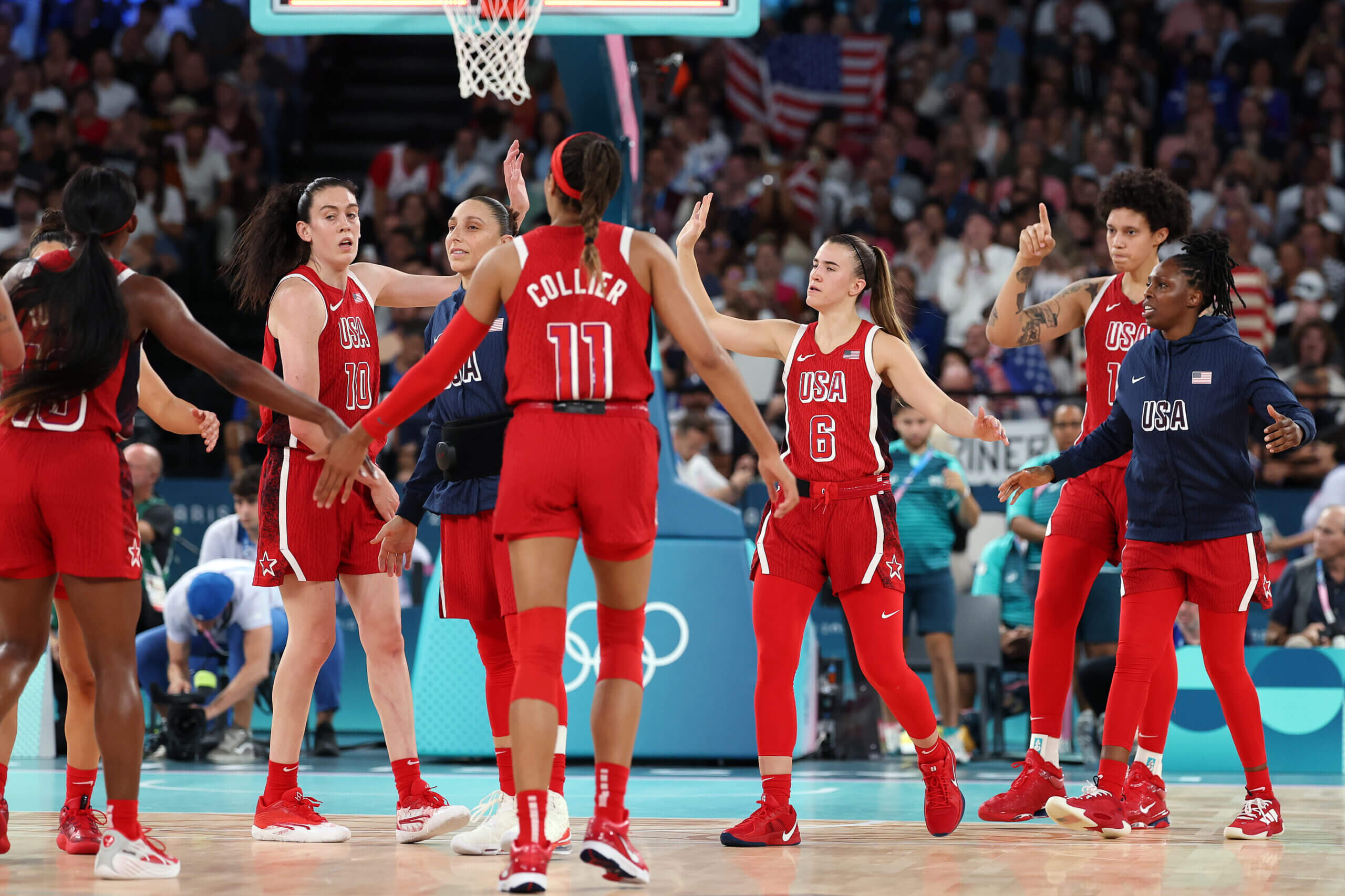PARIS — They played poorly in the first half against Nigeria. Like, not very good at all.
They led by 19 at the half.
This is life for the U.S. women’s national basketball team, which won its 59th consecutive Olympic game Wednesday, handling Nigeria 88-74 to advance to Friday’s semifinals, when they’ll play Australia. They’re now 76-3 all-time in Olympic play, dating back to when women’s basketball was introduced in 1976. They haven’t lost an Olympic basketball game since Aug. 5, 1992 — and I know that because I covered that game that day in Badalona, Spain.
It was late in the 1992 Summer Games. The U.S. women, like everyone else competing, were overshadowed by the NBA-dominant Dream Team. But that doesn’t mean the American women were any less expected to win the gold than the men. In their three pool games in Barcelona, they’d won by an average of 45.3 points per game. Teresa Edwards, Teresa Weatherspoon, Katrina McClain and Cynthia Cooper were all future Naismith Memorial Basketball Hall of Famers, as was their coach, Theresa Grentz.
But they lost in the semifinals to the Unified Team, an amalgam of former Soviet Union states, 79-73. And the emotion afterward wasn’t so much anger as shock. Losing seemed impossible.
And, since ’92, it basically has been.
This year’s U.S. women are two wins away from an eighth straight Olympic gold medal, a streak that began with the “Dream On” team in Atlanta in 1996. The program also hasn’t lost a game in World Cup play since losing a semifinal to Russia in 2006, winning 30 Cup games in a row since then, and four straight championships. In official FIBA competitions, the women have now won 80 straight games; the total record for the women across their Olympic, World Cup and junior national programs under USA Basketball is 174-3.
“Most dominant team of all time, I feel like, in any sport,” Kevin Durant said Tuesday night.
“You’ve got a potential six-time gold medalist in Diana Taurasi,” he continued. “So you’ve just got legendary players up and down the line, legendary coaches. It’s just setting the standard for what USAB is on the women’s side — not just the women’s side, but overall. So I’m looking forward to rooting them on.”
Wednesday, it was LeBron James and Katie Ledecky and Michael Phelps and Dirk Nowitzki and Devin Booker sitting courtside, watching the dynasty at work.
So why is the discussion almost always about who isn’t on this team in a given cycle, rather than who is?
You can make the argument — the key word here being “argue” — that the selection committee at USA Basketball gets important selections wrong, that there is politics involved rather than merit. This year, it was Caitlin Clark and Angel Reese and Arike Ogunbowale who were not selected for the team, just like it was Nneka Ogwumike in 2020, and Candace Parker in 2016. (Ogwumike, who’d been on the gold medal-winning World Cup teams in 2014 and 2018, was the only U.S.-born WNBA MVP not to make a U.S. Olympic team, leading Parker to call her omission “bulls—.”)
But, this is about who the committee has selected over the decades, and who was selected this year. Because that standard has remained impeccable for two generations of players, with a third — Clark, Reese et.al — on deck, likely to add to the dreadnought in 2028, when the Summer Games will be in Los Angeles.
Every player on the 2024 team has won at least one Olympic or World Cup gold medal. A’ja Wilson and Breanna Stewart each have two WNBA Most Valuable Player awards. Wilson and the other Las Vegas Aces on the squad — Kelsey Plum, Jackie Young and Chelsea Gray — are going for a W Threepeat.
Plum has two WNBA titles, a 3×3 gold medal from 2021, and was the WNBA All-Star Game MVP in 2022. She’s coming off the bench on this squad, not getting consistent minutes. And she hasn’t raised an eyebrow. She understands the assignment.
“It’s the gold standard, and really, that’s it,” Stewart said. “We expect to go and win gold. We know that everything leading up to that is important, and making sure we’re on top of our things. The way we prepare ourselves in practice, mentally and physically. And knowing that we carry a lot, because of those that have played before us.”

“We know history’s not going to win anything for you,” says Diana Taurasi, who is going for her sixth straight Olympic gold. (Marvin Ibo Guengoer – GES Sportfoto / Getty Images)
There have been longer streaks in the modern Olympic era. The U.S. men captured 16 consecutive gold medals in the pole vault between 1896 and 1968. The U.S. men’s swim team had won 15 straight gold medals in the 4×100 medley in swimming (excluding 1980, when the United States boycotted that year’s Summer Games in Moscow) between 1960 and 2020, before getting beaten here last weekend by China in the final. The Soviet Union/Russia captured 12 consecutive golds in pairs figure skating between 1964 and 2006.
And South Korea’s women’s archery team won its 10th straight Olympic gold medal here, a 36-year streak dating back to to the 1988 Games in Seoul, the sport’s Olympic debut.
Whether or not the U.S. women’s streak gets that long, it’s still hella impressive. Even if the weight of all that came before them chafes their shoulders. Who could live up to those ghosts?
“They don’t think about it as much as we all talk about it, because they weren’t a part of all of those,” U.S. coach Cheryl Reeve said Wednesday.
“That’s not on their minds,” Reeve said. “Their mind is on this journey, and their mission to win a gold medal. Sure, they hear the talk. But it’s not something they walk around thinking about, talking about. I think we’re a pretty focused team on just trying to win the next game.”
Nonetheless, what the U.S. women have done, collectively, is remarkable. No matter the coach, from Tara VanDerveer (1996), to Nell Fortner (2000) to Van Chancellor (2004) to Anne Donovan (2008) to Geno Auriemma (2012 and 2016) to Dawn Staley (2021) to, now, Reeve, and no matter the team’s leaders — Lisa Leslie and Sheryl Swoopes, to Tina Thompson and Sylvia Fowles, to Taurasi and Parker, to Sue Bird and Maya Moore, to Stewart and Wilson, there’s never been a hiccup. They keep winning, and winning, and winning.
They may not marinate in the history, but they understand the standard set before them.
“My first game in Tokyo, even though we didn’t have fans, I was like, ‘No, this is the Olympics,’” Wilson said. “Not a lot of people may watch WNBA games. They might not even care about it. But when we have those three letters across our chest and we’re playing for something gold, it’s like everyone’s tuned in. So it was one of those moments where I was like, no, this is a big, big moment. And I’m never going to take that moment for granted, because there could be many other people who could wish they were in this situation. And there’s many other people who’ve trained to be in it, and they haven’t been there. So I don’t take it for granted.”
The streak will, of course, end some day. The world isn’t catching up with the American women all at once, but it’s coming, in fits and starts. Teams know the leveling potential of shooting volume 3s, and some, like Japan, do so to good effect. Belgium, who’ll play the host French in the other semifinal Friday, has multiple WNBA players on its roster, including 2019 finals MVP Emma Meesseman. Nigeria was the first team from Africa, male or female, to make the Olympic quarterfinals, showing the substantive growth of basketball on the continent in recent years, through programs like the NBA-supported Basketball Africa League, FIBA’s Africa Women’s Basketball League and grassroots programs like Toronto Raptors vice chairman and president Masai Ujiri’s Giants of Africa.
Australia’s golden era behind Naismith Hall of Famer Lauren Jackson produced the World Cup gold medal in 2006 and three straight Olympic silver medals from 2000-2008. Jackson, now 43, plays a Taurasi-like role for this iteration of the Opals, who are ranked third in the world and are back in the semifinals with a roster loaded with WNBA talent like the Seattle Storm’s Sami Whitcomb and Ezi Magbegor, the Minnesota Lynx’s Alanna Smith and the Washington Mystics’ Jade Melbourne, and are coached by the Liberty’s Sandy Brondello.
As the WNBA expands in the coming years to cash in on its unprecedented popularity and economic growth, more jobs will be available. Inevitably, that means more international players will fill some of those spots — and use that W experience to help their national teams in the years to come. More dollars in the U.S. system for women’s basketball via the W and college basketball will inevitably seed programs around the world, through more camps and development programs.
Which is why having someone as decorated as Taurasi around still matters, no matter her stats, for her last Olympics. There is nothing she hasn’t seen or experienced in her 24 years of USA Basketball/FIBA play. She’s the O-est of Gs. No one’s won more at more levels, for as long. No one sets the tone better, or keeps the main thing the main thing better. She’s a human thermostat. It’s not that she’s going to go on a heater, at 42, and do what she could do 15 years ago on the floor to help you come back from a deficit in the semis or finals.
What she is going to do is set the tone that keeps you from ever getting complacent in the first place.
“We know history’s not going to win anything for you,” Taurasi said Wednesday. She’s probably said it a hundred times, whether while winning three straight national championships at UConn, or during her two decades in Phoenix, while leading the Mercury to three WNBA titles.
“We’ve won, I don’t know how many gold medals,” she said. “It’s not going to win this tournament. You come out and play hard. Nigeria. Australia, in two days. These teams are hard. They’ve been playing together a long time. We’ve been together for two and a half weeks, and we’re trying to figure it out. And it’s always been our strength to be unselfish. Next man up, next woman up, to win a gold medal.”
That’s why they’ve won for so long, and keep winning. They don’t think they’ve accomplished anything yet.

GO DEEPER
Why Caitlin Clark’s Olympics omission might be blessing in disguise for her rookie season
(Top photo of the U.S. women’s basketball team during Wednesday’s game against Nigeria: Gregory Shamus / Getty Images)





